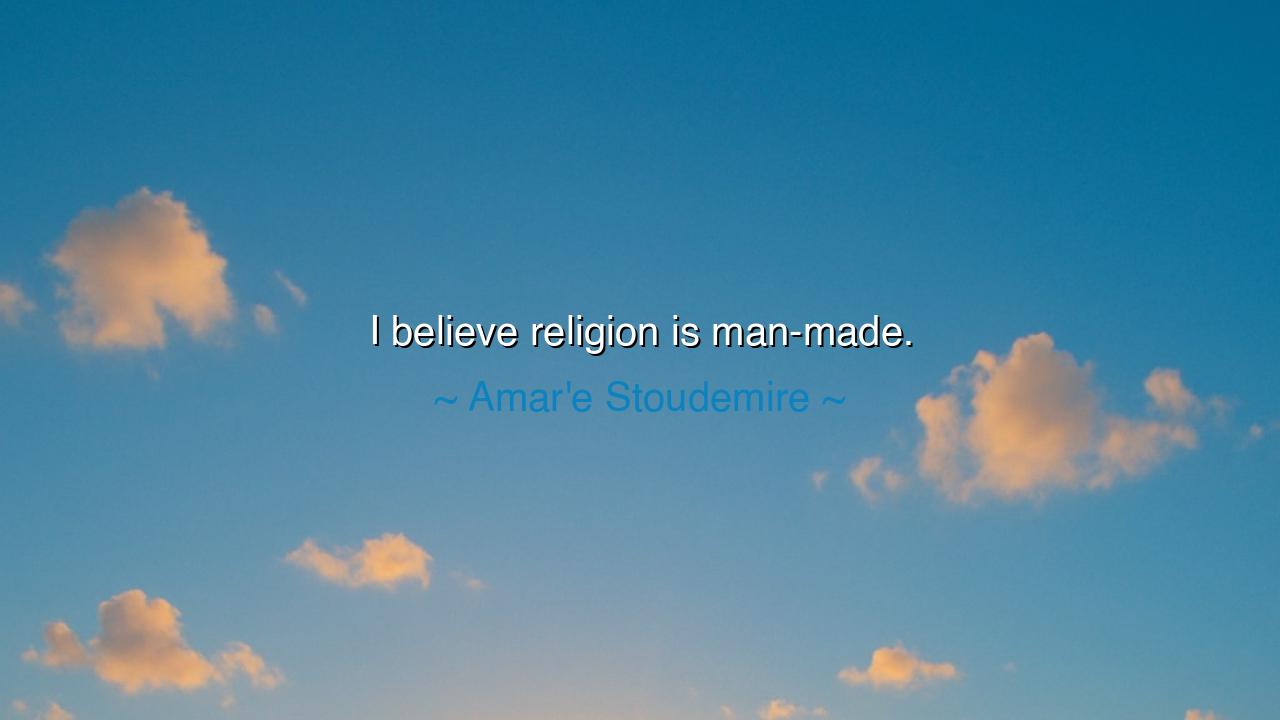
I believe religion is man-made.






Hear now the words of Amar’e Stoudemire, spoken with the candor of one who has wrestled with truth: “I believe religion is man-made.” This declaration is not light, nor is it careless. It is the recognition of a pattern as old as civilization itself—that men, in their hunger for meaning, in their fear of death, and in their longing for order, have shaped the garments of religion with their own hands. Where the divine may whisper faintly in the silence of creation, religion often speaks loudly, adorned with rules, ceremonies, and hierarchies, built not always by heaven but by human design.
From the dawn of tribes, men gazed into the night sky, trembling before thunder, awe-struck by fire, bewildered by the turning of seasons. Out of these mysteries arose rituals and myths, woven to explain what the mind could not grasp. Thus, religion was born not solely from revelation, but also from imagination, fear, and the need for unity. The ancients raised altars, carved idols, and inscribed laws, believing these to be divine commands. But in truth, much of what they fashioned bore the mark of humanity—its hopes, its pride, its politics. Stoudemire’s words cut to this reality: that religion may speak of God, but it is often shaped by man.
Consider the story of the Council of Nicaea in the year 325, when bishops and emperors gathered to decide what Christians should believe. Heated debates raged over the nature of Christ—was He of the same essence as God, or merely similar? The decision, stamped into creed, became law for millions. But was this decree the pure voice of heaven, or the compromise of men seeking unity in a fractured empire? Here we see clearly how religion, though cloaked in sanctity, bore the fingerprints of human hands. The faith endured, yes—but it was molded, redefined, and codified by human authority.
And yet, though religion is man-made, this does not strip it entirely of worth. For in their creations, men have preserved wisdom, cultivated compassion, and forged communities bound by shared rituals. The Psalms of David, the hymns of monks, the prayers whispered in deserts and cathedrals—all are human in form, but divine in aspiration. Religion may be born of man, but within it flickers the eternal longing for what lies beyond man. It is both flawed and profound, both chain and wing.
Stoudemire’s words should not be read as mere rejection, but as invitation: an urging to separate the eternal from the earthly, the divine whisper from the human institution. To say religion is man-made is to remind us that no creed, no temple, no scripture should be immune from question. If it is man-made, then it can be tested, weighed, and reformed. If it is man-made, then its errors can be unmasked, its abuses confronted, and its truths preserved.
The lesson is clear: do not mistake the vessel for the water it carries. Question boldly, even in the halls of tradition. Seek the essence of the divine not in the dogmas crafted by councils and kings, but in the compassion of the heart, in the justice of action, in the wisdom of life itself. Use religion as a ladder if it lifts you higher, but never let it become a cage. Remember always that human hands built its frame, and human minds can renew or discard what is false.
Therefore, children of tomorrow, let this be your practice: honor the yearning for the sacred, but do not be enslaved by man’s inventions. Read, question, reflect. When you encounter a law or a ritual, ask: “Does this bring me closer to truth, to love, to justice?” If it does, embrace it. If it does not, release it. For though religion may be man-made, the quest for truth is eternal, and that quest belongs to you. And in walking it with courage, you will discover the divine not in chains of tradition, but in the boundless freedom of a seeking soul.






AAdministratorAdministrator
Welcome, honored guests. Please leave a comment, we will respond soon